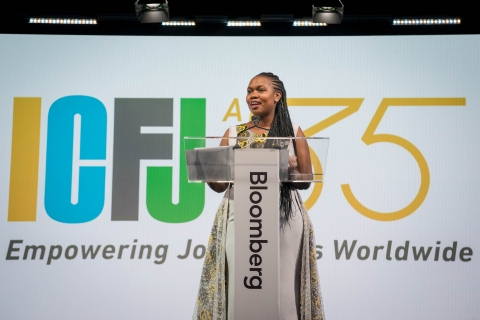
The International Center for Journalists (ICFJ), the ONE Campaign, and the Elliott family are happy to announce a call for entries for the Michael Elliott Award for Excellence in African Storytelling.
The award honors up-and-coming journalists in Africa who strive to strengthen people's voices and illuminate the transformational change taking place on the continent. The award entries must represent groundbreaking journalistic work published between December 1, 2024, and December 1, 2025. Winners will be selected on the quality of their piece and the impact their work has had in communities. We welcome excellent submissions in all media, especially those that demonstrate analytical skills in addition to outstanding writing ability.
The winners will receive a $5,000 cash prize and a personalized award certificate. The winners will have an extraordinary opportunity to complete a two-week internship at The Economist in London, UK, from June 22, 2026, to July 3, 2026.
Eligibility
- The contest is open to English-speaking journalists working in Africa for print, broadcast, and online news media. Applicants must have no more than 10 years of journalism experience.
- Applicants must submit one published piece that exemplifies Africa through thoughtful reporting and excellent storytelling. We are looking for impactful investigative or explanatory pieces, especially those that illuminate transformational change in Africa.
- A copy of the published story or broadcast clip must be submitted in English. Works in other languages must include English translations. We welcome submissions from print, broadcast, or digital journalists. Multimedia submissions may include web, audio, video, visual, or mixed media.
- The submitted story must be published between December 1, 2024, and December 1, 2025.
A distinguished international jury including media leaders from the US, UK, and Africa will select the winners. We will reach out to all applicants to notify them of their status by the spring of 2026.
The application form for the 2026 cycle is available here. The deadline for applications is Sunday, January 9, 2026.
About the Award
The Award was established in honor of Michael Elliott, an outstanding editor, philanthropist, and former ICFJ director, whose life was a testament to the power of storytelling to bear witness to and improve the human condition. Elliott served as a distinguished editor at The Economist, Newsweek, and Time before becoming CEO of ONE. In 2016, he had spoken of his dream to establish an award that would bring together his belief in great journalism with his commitment to progress in Africa. This prestigious annual award recognizes emerging journalists in Africa who strive to strengthen people's voices and illuminate the transformational change taking place on the continent.
Past award winners include Mercy Juma and Dorcas Wangira of Kenya; Kiki Mordi, Abubakar Ibrahim, Zainab Bala, and Adekunle Adebajo from Nigeria; Farai Shawn Matiashe from Zimbabwe; and Bernadette Vivuya from the Democratic Republic of Congo. Adebajo’s winning story, “Keeping Up With The Chibok Girls," examines the fate of some of the students kidnapped by Boko Haram in 2014 who later escaped or were released from captivity. Matiashe’s story for CNN spotlights an all-women fishing cooperative on the Zambezi River in Zimbabwe, the first such group in the community. Akua’s winning entry for BBC Future Planet, “The Invasive Weed that Traveled the World,” examines how a fishing community in Cameroon is racing to save Lake Ossa, one of the country’s largest, from an invasive plant that thrives in warm freshwater. Bencherif’s story, “How Climate Change Turned This Moroccan Village into a Ghost Town,” describes how parts of Morocco, including his hometown, are now uninhabitable due to climate change. Vivuya’s winning entry focused on children in Congo who toiled in niobium, cassiterite and coltan mines that produce raw materials used in making capacitors for electronic devices. Mordi’s story, “Sex for Grades,” exposes sexual harassment in African universities. Bala’s documentary The Almajiri is a gripping documentary that focused on children in northern Nigeria who left their homes for Islamic education in the nation’s capital where they were neglected and abused by their religious teachers. Ibrahim's piece, "All That Was Familiar," chronicles the struggle of two women --one from Cameroon and one from Nigeria -- to find their loved ones who had been internally displaced by Boko Haram's insurgency. Juma's story, “Teen Mums of Kwale,” tells of primary school girls whose families make the controversial choice to let them use contraceptives even though the practice is taboo in the Muslim communities of Kenya’s Kwale County. Wangira's award-winning story, “The App and The Cut,” covered the harm caused by female genital mutilation and the hope offered by five high school girls who invented an app to connect vulnerable girls with resources and rescue centers.
Most recently, Godwin Asediba’s winning story,“Troubled Morgue,” reveals the horrific conditions within a Ghanaian morgue. And Silas Jonathan’s article, “How Telegram, TikTok aided Russian disinformation that led to incarceration of Nigerian minors,” demonstrates the ways in which foreign disinformation campaigns can influence African politics and society.

